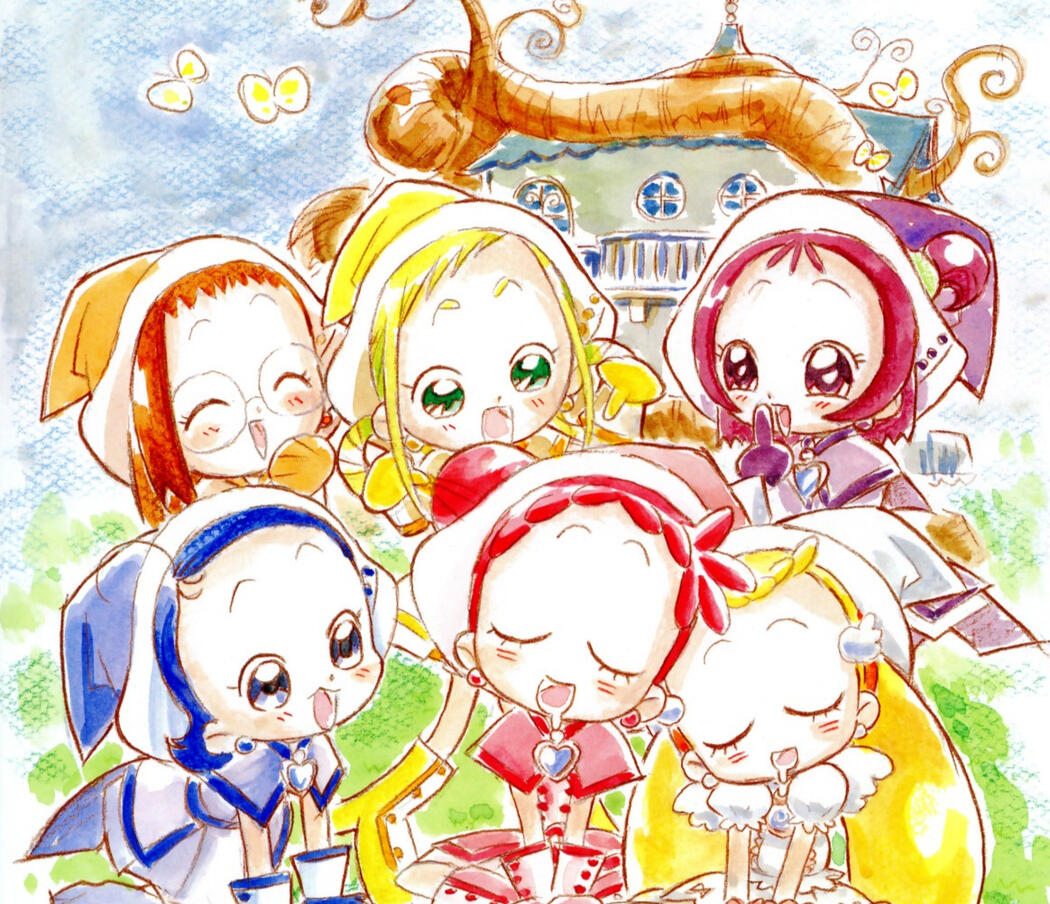
Owaranai Monogatari
Q&A
Who are you and what is this?
I'm Umeko, a longtime Ojamajo Doremi fan! I'm an American expat currently living in Japan, where I teach English.
Owaranai Monogatari was originally a lyrics website I created for the 15th anniversary of Ojamajo Doremi, but at the time I became too busy to keep up with website updates and ultimately I misplaced everything except the text translations! So now I'm using those text translations to create lyrics videos (color-coded where applicable).
I'm experienced with fan translations but not so much with video editing, so please don't judge me too harshly on that front haha.Where do you get your images for the videos?
Majopedia, Zerochan, my own collection sometimes. I won't use fanart unless it's my own or in the unlikely event that an artist specifically offers a piece they've drawn for me to use. Even then, I prefer to use official images.Are you really certain about all the line distributions you've color-coded?
Not always! When it comes to the more contentious ones where the girls might sound the same, I do listen over and over, carefully judging voice qualities and audio channels, so I try to be reasonably sure of the color coding before publishing a video. Any specific reservations I have will be notated in the individual video's description.
If you REALLY disagree with something I've color-coded and want me to make extra sure, I can try asking the seiyuu directly (they're all relatively easy to get in touch with, aside from Otani), but I'd rather not bother them for something so silly haha.Some parts of your translations are wrong! They're completely different from other translations I've read before!
In 99% of cases, this is because the translations you've seen before are the wrong ones. This isn't hubris on my part; it's an objective assessment of my skill. I've been studying Japanese for more than 20 years, translating for most of that time, and certified N2 (conversationally fluent) in 2010. (N1 certification - business fluency - is in the works.)
The last 1% is human factor - I'm not perfect, and I totally could have made a mistake! Feel free to ask me to take a second look if you feel something's off.
FURTHER LINGUISTIC GEEKERY
I DO know some Japanese and I found some lines that aren't translated correctly!
It might have been a line that I chose to localize to make more sense or sound better to an English-speaker's ear. For example, "あっちもこっちもそっちも" from "Sora made Jumping"; directly translated, it would be along the lines of, "there, here, and there," but there are issues with this, some more obvious than others. I translated it to "here, there, and everywhere," because it sounds more natural to an English-speaker for "here" to precede "there," and the "everywhere" is implied from the original line indicating all possible distances.
That's just one example, of course, but that's the sort of thought process I go through when I'm translating those sorts of lines.
Note that I localize for more clearly expressing intent, not for "Americanizing" Japanese culture mentioned in lyrics.What's with your romanization?
I admittedly don't properly adhere to a commonly-accepted romanization standard, but rather use my own system that I think comes the closest to preserving the linguistics of Japanese in a way that helps Anglophone anime fans (who already have basic, albeit perhaps minimal, knowledge of Japanese pronunciation) to largely grasp the correct pronunciation. Breaking it down, it's mostly Modified Hepburn, but for elongated vowels I use Wapuro-shiki; there are other tiny discrepancies but it's nothing that really matters in a non-academic setting.
When it comes to English loanwords written in katakana, I'll generally write them in English instead of romaji unless they're shorter words commonly used in Japanese vernacular (such as "haato" instead of "heart").
Words are spaced primarily based on sentence function, secondarily on aesthetics (particularly in the case of complex, unwieldy verb conjugations).The character names/spells are spelled weird!
With only one exception, I use the official spellings of character names and spells.
"Hazuki" has been spelt "Hazuki" on all Ojamajo Doremi merchandise featuring English spellings ever since 1999. There might have been a few one-off instances of "Haduki" back in the early 2000s or something, but never, ever "Hadzuki." "Hadzuki" isn't even proper romanization by any commonly-accepted standard in modern times; to my knowledge, the romanization of づ to "dzu" only exists in a version of Hepburn that has been obsolete since 1886. So, yes, it's spelt "Hazuki" lol.
English spellings of spells have been featured on official merchandise, staying consistent in recent years (aside from one cosmetics line), so those are the spellings I use. Yes, "pirirara" is officially the correct spelling.
The only official spelling that I reject is "Majolika," which is what has been consistently used on merchandise since at least the 15th anniversary. I don't like this spelling, NO ONE likes this spelling, so I've made the executive decision to use "Majorika" instead (which was the spelling used on older merchandise anyway). No space between "majo" and "rika"; her name has always been a single word in all merchandise that features it.Why do you sometimes use a weird mix of American and British English? Even in the question above you used both "spelled" and "spelt."
That's just a me problem.